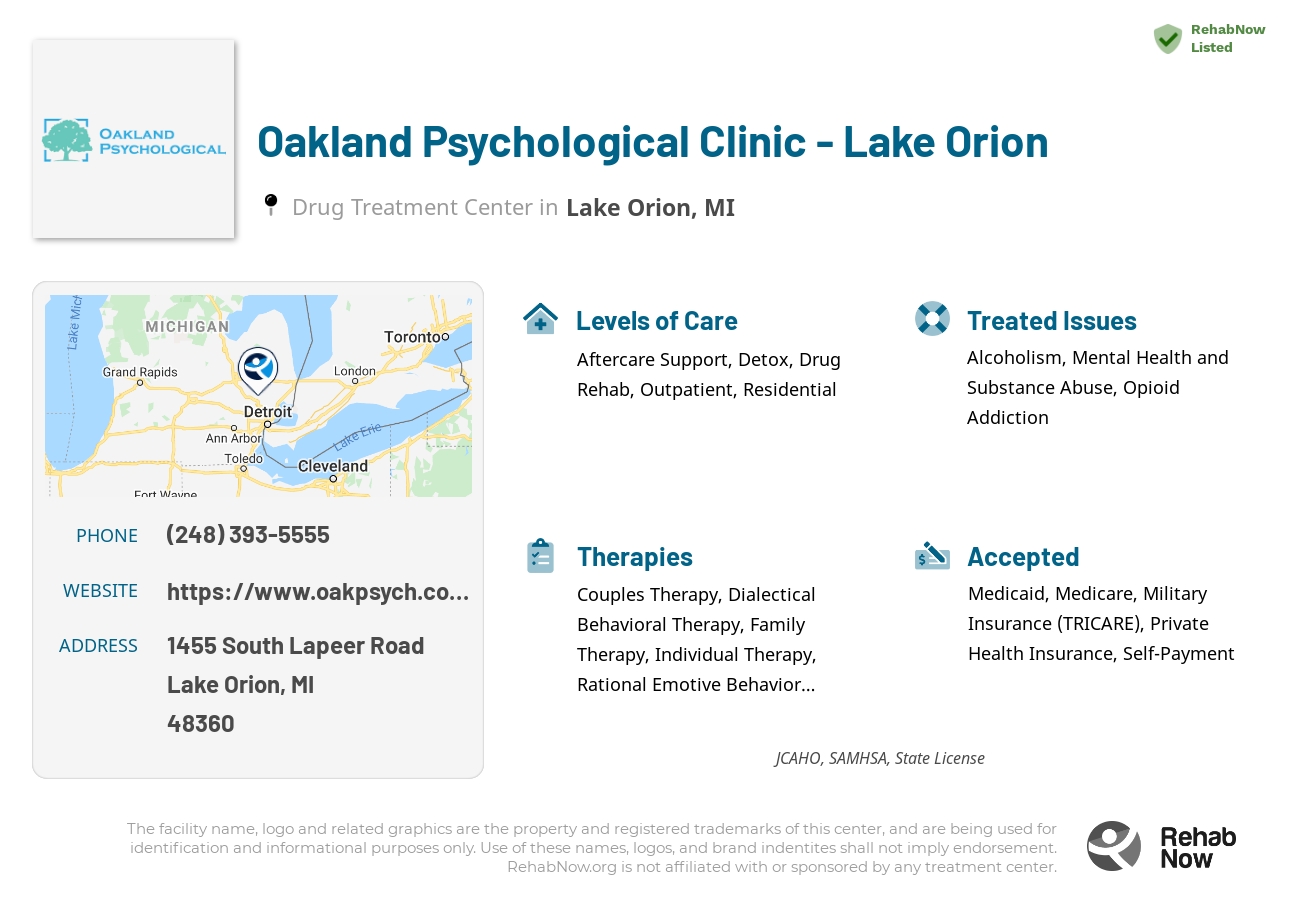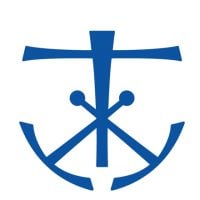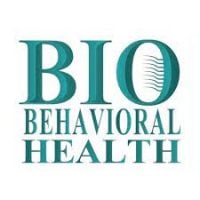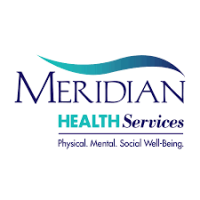Oakland Psychological Clinic - Lake Orion
Drug Rehab Center in Lake Orion, Michigan
Oakland Psychological Clinic - Lake Orion is a mental health clinic in Michigan that specializes in addiction and substance abuse treatment, including individual, group, and family counseling, and offers various levels of care for clients, such as outpatient, intensive residential treatment, and aftercare support.
About Oakland Psychological Clinic - Lake Orion in Michigan
Oakland Psychological Clinic - Lake Orion, located in Lake Orion, Michigan, is a mental health clinic that specializes in the treatment of addiction and substance abuse. They offer various levels of care for clients, ranging from outpatient and group services to intensive residential treatment. The ultimate goal of Oakland Psychological Clinic-Lake Orion is to help individuals break free from addiction and create a life of recovery.
Oakland Psychological Clinic-Lake Orion offers a wide range of services for addiction treatment, including individual, group, and family counseling; psychological assessment; substance abuse education; relapse prevention; and aftercare support. In addition to evidence-based therapies, they also offer holistic and experiential therapies, such as mindfulness-based approaches and art therapy, to assist individuals in their recovery journeys.
Oakland Psychological Clinic-Lake Orion is accredited by the Commission on Accreditation of Rehabilitation Facilities and is licensed by the Michigan Department of Licensing and Regulatory Affairs. In addition, they have received multiple awards, such as the 2020 Best of Lake Orion Award by the USA Local Business Association and the 2020 Caring Star Award from Caring.com. Oakland Psychological Clinic-Lake Orion strives to provide the highest quality of care for those struggling with addiction and substance abuse.
Genders
Ages
Modality
Additional
Accreditations
State License
SAMHSA

JCAHO
Conditions and Issues Treated
With so many people addicted to opioids, we need to help those who want to quit. The cycle begins when opioid addicts take opioids for a painful injury. When someone starts taking their medication differently or in excess, it means they’re addicted and at risk of overdosing.
In , detoxing from these types of treatments is the most effective way to beat this. Most facilities begin with medical assistance and then provide counseling services; rehabilitation follows after successful treatment.
Levels of Care Offered
This center offers a variety of custom treatment tailored to individual recovery. Currently available are Aftercare Support, Detox, Drug Rehab, Outpatient, Residential, with additional therapies available as listed below.
Detox is an integral part of recovery and often very hard. Detoxification is the process of letting the body remove the drugs in it. It addresses the physical aspect of addiction. Detox from drugs can be unsafe as the patient undergoes withdrawal symptoms that range from headaches, vomiting, body aches to seizures and cardiac arrests. The main purpose of detox is to keep the drug users comfortable as the drugs leave their system.
Quitting cold turkey is not recommended and can lead to many issues. Detox is best done under medical supervision so that a team of experts can monitor the side effects and complications. Detox, alone, does not guarantee sobriety as the underlying psychological issues are not addressed.
Alcohol or drug addiction, or co-occurring disorders, are treated in an outpatient program. The patient must attend therapy and other programs at the facility but can return home each night.
Outpatient treatment allows recovering addicts to live at home while receiving addiction treatment. Outpatients can attend group sessions for a few hours per week. Outpatients may also continue to work full time and study/attend school without interruption if they choose.
Residential treatment programs are those that offer housing and meals in addition to substance abuse treatment. Rehab facilities that offer residential treatment allow patients to focus solely on recovery, in an environment totally separate from their lives. Some rehab centers specialize in short-term residential treatment (a few days to a week or two), while others solely provide treatment on a long-term basis (several weeks to months). Some offer both, and tailor treatment to the patient’s individual requirements.
The accomplishment of completing a drug or alcohol treatment program is just the first step. Once that is complete, aftercare support comes into play. This includes helping people adjust to life without substances outside of guidelines with assistance like getting sober living accommodations and career counseling and AA/NA programs for those who are struggling between sobriety or want continued help in maintaining it once they have completed their initial rehabilitation at an addiction facility.
Aftercare comprises services that help recovering addicts readjust to normal day-to-day activities while working on specific issues. These problems include psychiatric issues, family problems caused by substance abuse, continuing education pursuits if desired during rehab, etc. These can last up to one year+ depending on what’s needed most urgently upon completion of earlier stages.
Therapies & Programs
Different people react differently to various treatment options. Some drug rehabilitation centers offer individualized treatment that caters to the specific needs of a drug addict. The best treatment option varies on an individual depending on the type of drug abused, life history, medical condition of the person, social circumstances, and the environment they live in now.
When a person enters drug rehab, they usually have anti-drug associations such as withdrawal symptoms, stress, cravings, etc. The first step of drug rehab is to detoxify the body from any residual substances in it. Drug rehabilitation centers usually employ trained medical professionals to help in this process. Usually, the initial detoxification lasts for five days, where the person is monitored under close supervision.
Couples therapy is a treatment method used to help couples in which at least one member of the couple has a drug addiction. The treatment is designed to help the couple strengthen their relationship to minimize the effects of drug addiction on their lives and promote healthy communication between them.
Couples therapy can be used whether the addicted partner is using drugs or in recovery. It helps the couple create healthy communication and coping skills to minimize the problem-solving abilities of one partner, which can then be directed at solving issues related to their addiction. It also helps couples address problems that may be related to drug addiction. Couples therapy can help couples feel like a team and not feel like their partner is the problem.
Couples therapy is very challenging for both the drug addict and their partner. It requires an intense commitment between the two individuals to participate in the sessions and the homework assigned between sessions.
An additional benefit of couples therapy is that it can help make other types of treatment, such as 12-step programs, more effective.
Family therapy sessions typically involve the addict and their family members. During these sessions, a therapist will work with everyone involved to help them understand addiction and find healthy ways of coping without substance abuse.
Some addicts might feel embarrassed about their substance abuse problems. By encouraging family members to attend these sessions, therapists can show addicts that they’re not alone in dealing with addiction. Therapists can also work with family members to help them understand addiction and learn how to offer support and encouragement to their loved one as they deal with substance abuse issues.
Trauma therapy is a form of therapy used to help people process and understand past traumas. This can help struggling addicts, as many people turn to drugs or alcohol to mask the pain of their past. Trauma therapy can be done in several ways, such as through visualization, discussion, and writing down thoughts and feelings. The goal is to help the individual understand why they are having problems coping with certain situations and changing how they think and react to things. This is often done in tandem with other therapies to treat the underlying issues associated with addiction.
The idea behind trauma therapy is that while some people can experience traumatic events and not have lasting psychiatric symptoms, many others will. In these cases, memories get hidden from consciousness but continue to influence how the person processes and copes with things in their life. They may avoid situations that resemble what happened or become suddenly angry or irritated to a situation that reminds them of a past event. With the help of a therapist, people can go back over memories and experiences. This helps them understand why they are having problems coping with certain situations and changing how they think and react to things.
This type of cognitive-behavioral therapy helps people understand how their thoughts, behaviors, and feelings are interconnected. It can help patients with borderline personality disorder gain control over their actions and stop self-harming thoughts and attempts.
Cognitive Behavioral Therapy is a type of psychotherapy that helps people address the thoughts and behaviors that may have led to their addiction. It also helps change negative thoughts into positive ones and promotes healthy communication between addicts and those around them. CBT is an efficient treatment for individuals suffering from all sorts of addictions.
Cognitive Behavioral Therapy (CBT) focuses on the underlying thoughts and behaviors that caused the problem of addiction in the first place and may cause a relapse. Negative feelings are common in drug abuse disorders, but they can lead to co-occurring disorders if not recognized. CBT involves strategies that help to change the behavior pattern by restructuring negative thoughts into positive ones. It helps to remove these feelings, and it provides long-term benefits. Also, CBT promotes self-awareness, self-control and can be administered as a mono-therapy or as part of combination therapy.
The use of Rational Emotional Behavior Therapy for addicts has been shown to have positive and desirable outcomes. It is a form of specific counseling that replaces negative and self-limiting thoughts with positive and productive behaviors. Self-defeating thoughts and habits can limit your possible successes. Some examples of this are procrastination, unhealthy eating, and angry outbursts. You may not be aware that some unhealthy behaviors and thoughts are sabotaging your potential accomplishments.
Payment Options Accepted
For specific insurance or payment methods please contact us.
Is your insurance accepted?
Ask an expert, call (888) 674-0062
Oakland Psychological Clinic Associated Centers
Discover treatment facilities under the same provider.
- Oakland Psychological Clinic - Lake Orion in Lake Orion, MI
- Oakland Psychological Clinic - Milford in Milford, MI
- Oakland Psychological Clinic - Livonia in Livonia, MI
- Oakland Psychological Clinic - Grand Blanc in Grand Blanc, MI
- Oakland Psychological Clinic - Flint in Flint, MI
Learn More About Oakland Psychological Clinic Centers
Additional Details
Specifics, location, and helpful extra information.
Lake Orion, Michigan 48360 Phone Number(248) 393-5555 Meta DetailsUpdated November 25, 2023
Staff Verified
Oakland Psychological Clinic - Lake Orion Patient Reviews
There are no reviews yet. Be the first one to write one.
Lake Orion, Michigan Addiction Information
Michigan has the second-highest rate of drug and alcohol abuse in the nation. Heroin is linked to more than 50% of the state's hepatitis C cases. Marijuana is the drug most often associated with crimes in Michigan, followed by methamphetamines. Opioids alone are responsible for almost 20% of all drug overdose deaths in Michigan.
In Lake Orion, Michigan, the usage of illicit drugs appears to be getting worse. The city has a higher-than-average rate of illicit drug use, and heroin abuse is especially rampant. In addition, alcohol abuse is also a major issue in the city. This makes it critical that residents seek out quality drug and alcohol rehab centers in Lake Orion, Michigan, that can help them overcome their addiction problems.
Treatment in Nearby Cities
- Coldwater, MI (106.2 mi.)
- Romulus, MI (38.0 mi.)
- Ontonagon, MI (411.6 mi.)
- West Branch, MI (116.1 mi.)
- Three Oaks, MI (184.7 mi.)
Centers near Oakland Psychological Clinic - Lake Orion
The facility name, logo and brand are the property and registered trademarks of Oakland Psychological Clinic - Lake Orion, and are being used for identification and informational purposes only. Use of these names, logos and brands shall not imply endorsement. RehabNow.org is not affiliated with or sponsored by Oakland Psychological Clinic - Lake Orion.











